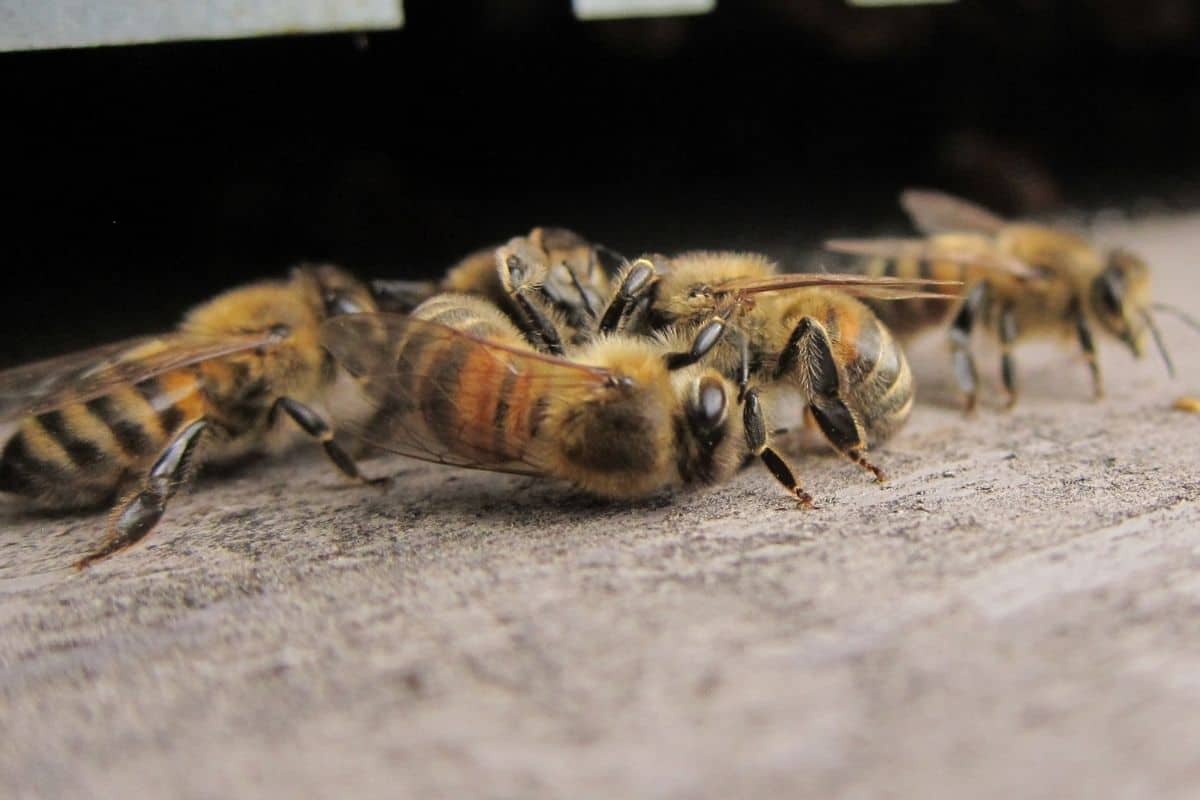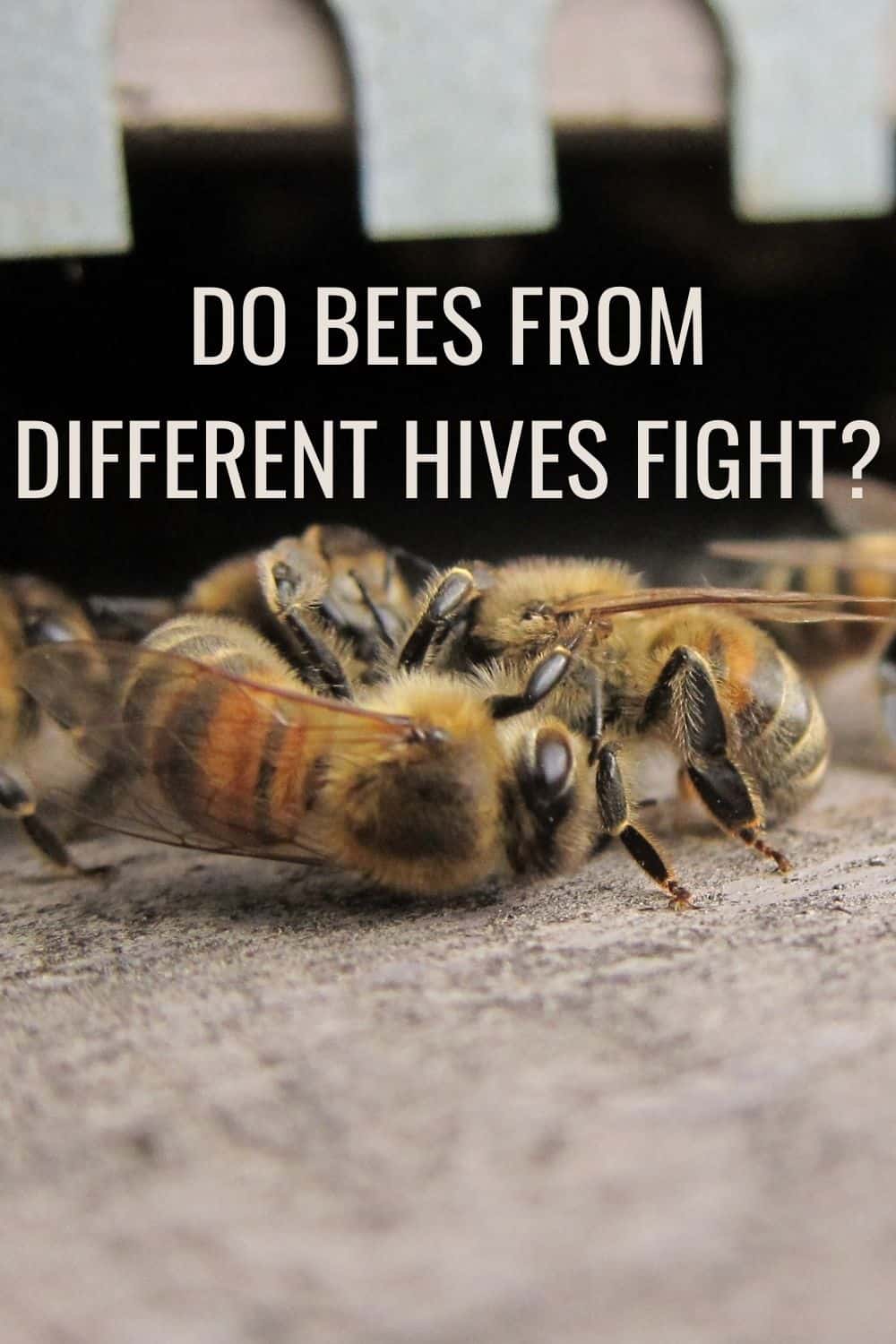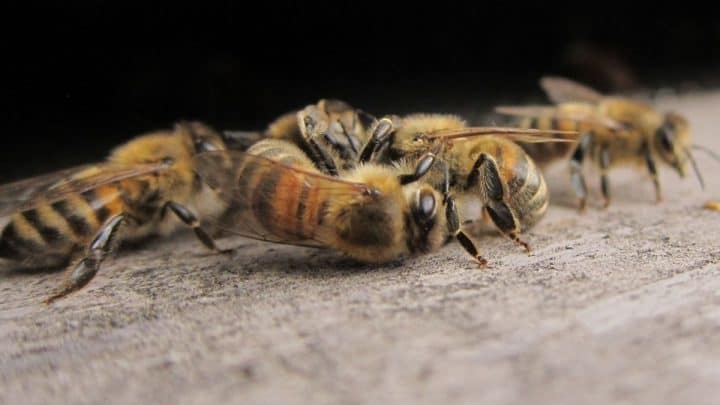We are all familiar with bees buzzing in and out of flowers, collecting pollen, and building hives. They are such industrious creatures that we would probably guess that they have no time for politics, fighting, or hive wars. When we think of nature, though, many animals or insects are aggressive to each other, even when they are from the same species. Dogs fight, different prides of lions fight each other, ants are definitely not welcoming to other ants, so what about bees? Do bees from different hives fight?
Bees from different hives sometimes fight each other. Fighting usually only occurs when there are specific conditions, such as nectar shortage or if a bee colony’s hive has been destroyed. Intruder bees are kept out by guard bees, and they are generally killed if they try to enter the hive.

Bees live in orderly, organized societies, but that does not mean that they have gentle or refined habits.
Do Bees Fight Each Other?
It is quite common for beekeepers to situate several hives in reasonably close proximity. This practice would lead us to believe that bees from neighboring hives never fight each other. It is an incorrect belief because, under certain conditions, bees do fight with bees from other hives.
There can be same-species bee fighting as well as interspecies fighting amongst bees. It usually only occurs when one colony of bees attacks another colony of bees. This behavior is triggered by certain conditions and only happens occasionally.
Are you a new beekeeper? Learn more about keeping bees.
Can Bees Identify Bees From Other Hives?
Scientists have studied the ability of bees to recognize their nestmates from intruders. They concluded that bees use smell to differentiate friend or foe. Bees’ bodies are covered by a cuticle (outside layer) that contains pheromones. Pheromones are hormones that emit odors for the purposes of communication.
Researchers have determined that each bee has individual pheromones as well as environmental pheromones. Environmental pheromones are transferred to the bee when it spends time in the hive. These pheromones are a complex of smells resulting from the queen bee’s pheromones in the hive, the wax, and the bees’ food sources.
Guard bees smell new arrivals at the nest and decide whether they are allowed entrance or not. Occasionally the bee guards make errors and permit an intruder in or attack one of their nestmates.
What Are Robber Bees And Why Do Bees Fight Them?
There may be a shortage of nectar in certain conditions, which is a death knell for any beehive. The bees that cannot find nectar become alarmed and try to find nectar or a food source. These bees are called robber bees when they enter another bee colony’s hive and steal honey. Robber bees can consist of only a few bees, or it can be a whole swarm of bees intent on stealing honey and other resources.
Nectar could be in short supply due to the following conditions:
- Heavy rainfall over a long period dilutes or washes nectar out of flowers
- A sudden unseasonal weather change or event that affects the plants
- A fire destroys plants in the area
Bees from the hive will fight the intruders to the death to prevent them from stealing precious honey supplies. Robber bees can steal so many resources from a hive that the original colony dies.
How do robber bees gain access to the hive if there are guards?
Hives that have more than one opening or have cracks are difficult to guard. Robber bees can be seen flying around the nest, attempting to find unguarded openings. They arrive at the nest without pollen and fly quickly and lightly. If they find a way into the hive and manage to steal honey, they leave heavily laden with the stolen honey.
Why Do Bees Invade Another Hive?
A colony of bees sometimes invades another beehive in a hostile takeover known as usurpation. This phenomenon usually occurs late in summer when the weather is hot and dry. A rogue swarm forms and begins looking for a hive to invade.
The usurpation swarm may be of a smaller number of bees than the hive they invade. The purpose of the takeover is to kill the resident queen and install their queen with their hive genetics. The fact that many of the rogue swarm bees will die does not deter them, as their sole focus is to replace the queen.
The rogue swarm would probably not survive the winter as they do not have a well-constructed hive or sufficient honey supplies. Taking over another hive ensures that their colony lives through the winter and their genetic lineage lives on.
In some instances, once the new queen is installed, any of the original bees that survive will accept the new queen and become part of an amalgamated swarm.
Dr. Mangum first described the usurpation phenomenon in the American Bee Journal of May 2019. In this article, he notes that this is a relatively new behavior amongst bees of the same species. The behavior only began to occur about ten years before Dr. Mangum’s article.
Is There Bee Fighting Between Species?
For many years, it has been well-known that African honeybees introduced into America aggressively attack the milder tempered European honey bees. In many areas, it has become difficult for beekeepers to protect their European honeybee hives.
A 2014 BBC science article describes the wars and battles between two different species of stingless bees in Australia. The attackers were generally indigenous stingless bees, and they targeted European stingless bees that apiarists were keeping.
Although the bees have no stings, they attack by gripping their opponent tightly. Both bees usually die in the process. The attacking bees dragged the worker and younger bees from the hives. Ecologists noted that these attacks were completed with the new colony installed in under twenty minutes.
Australian apiarists are being encouraged to consider keeping indigenous bees to prevent the loss of bees through these attacks and facilitate bee culture.
In Conclusion, Do Bees From Different Hives Fight?
Bees from different hives do sometimes attack each other. It is often provoked when there is a shortage of resources, and the invading bees will not survive the winter. Bee wars can take place between bees of the same species of bees of different species. Robber bees can be individual bees or a bee swarm that steals honey to take back to their hive.




Quick Introduction To Beekeeping
Wednesday 3rd of August 2022
[…] Do Bees From Different Hives Fight? […]